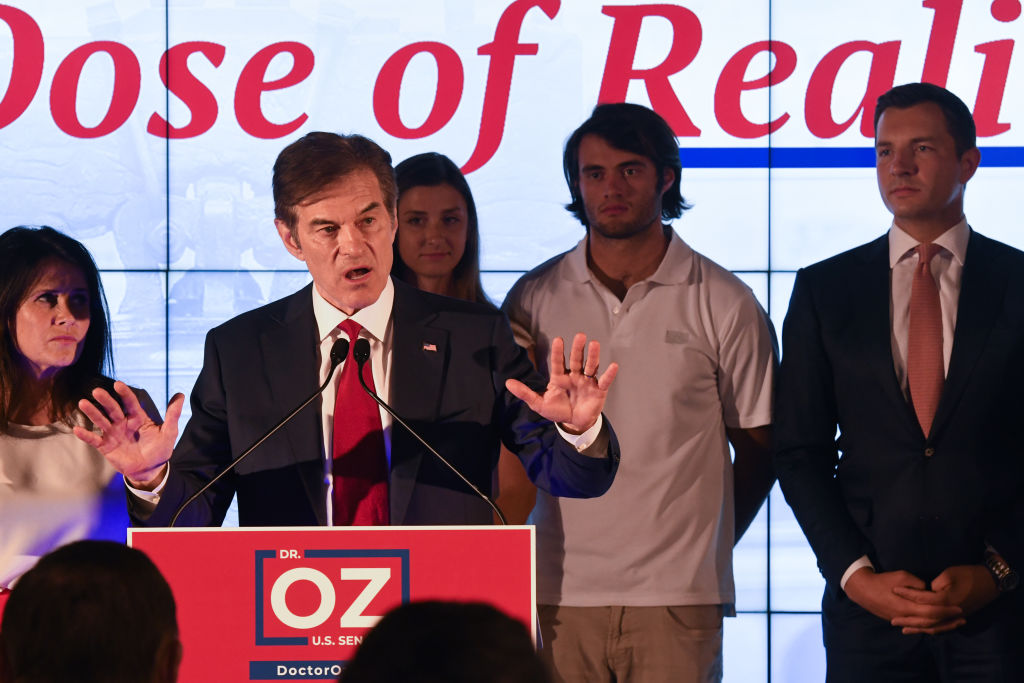Hotly contested primary races across the nation have been seeking to determine who will be on the ballot come the November congressional elections. From Pennsylvania to Oregon, political watchers on May 17 sifted the tea leaves to determine whether the Democratic Party could maintain the majority in either chamber. But more notable, perhaps, is the lens through which all the races so far have been evaluated: The influence of Donald Trump.
The 45th president is, indeed, living rent-free inside the collective head of the legacy media, as barely a single article on the primaries is complete without at least a nod to Trump. With bated breath, the Fourth Estate hoped to declare an end to the America First movement. The voters, for the most part, had other ideas.
PA Senate
At the time of publishing, the GOP race for the Senate seat being vacated by retiring Pennsylvania Republican Senator Pat Toomey is still too close to call. The three-way contest between Dr. Mehmet Oz, David McCormick, and Kathy Barnette has been the most commented upon race of the season and seems set to end in an automatic recount. Pennsylvania law requires that a recount be performed if the margin is less than or equal to 0.5% of the overall vote.
Oz has a slight lead with 31.3% compared to McCormick’s 31.1% – a difference of around two and a half thousand ballots. Barnette is a distant third with 24.8%, and the other four outsiders are each racking up less than 6%. Both leading candidates have made public statements expressing their confidence in the eventual outcome, but it seems the result will come down to mail-in and absentee ballots.

Mehmet Oz (Photo by Stephanie Keith/Getty Images)
In terms of momentum, McCormick had the edge through March and much of April polling, until Trump gave an endorsement to Oz. Since then, every survey has handed the lead to the TV doctor. Most surprising was the campaign of Kathy Barnette, who started March with under 7% support and came within striking distance of the prize. Despite not being endorsed by Trump, Barnette declares herself an America First candidate and is openly supportive of the former president. This suggests that although McCormick might win the nomination with around 30%, voters committed to Trump and the America First movement command more than 55% of the region’s Republican electorate.
The Democrat primary was won handily by Lieutenant Governor John Fetterman, who scooped 59% of the vote, more than doubling the share of his closest rival, Conor Lamb.
Democrats are hoping that they will be able to take this seat in November. It has the potential to be the difference between emerging from the midterms as either the majority or the minority party, and is considered one of their best chances. In 2016, retiring Senator Pat Toomey held this seat by just half a percent; in 2010, he won it by only one percent.
PA Governor
Trump-endorsed Pennsylvania state Senator Douglas Mastriano won his primary with roughly 45% of the vote share, more than doubling his closest rival, former Rep. Lou Barletta. The much-coveted endorsement arrived late in the campaign – on May 14 – when Mastriano was polling at around 18%. When news of the nod broke, his stock rose quickly, with the latest pre-primary polling coming in at almost 35%.
Attorney General Josh Shapiro ran unopposed for the Democrat nomination and will face off against Mastriano in November to replace term-limited Governor Tom Wolf. The retiring governor had a significant boost in 2018 when he increased his overall vote share by almost 3% over his 2014 win. However, his popularity has been waning since then and he now has a minus one approval rating which could prove troublesome for Shapiro, who is seen as a continuation candidate.
NC House
 One of the most surprising results of the evening was North Carolina incumbent GOP Rep. Madison Cawthorn’s loss to Chuck Edwards in the 11th district race. Edwards claimed 33.4% of the primary vote against Cawthorn’s 31.9%. Despite Trump’s endorsement, a recent spate of scandals scuppered Cawthorn’s chances. The former president sent out a last-minute message to supporters on his Truth Social platform, saying, “Recently, he made some foolish mistakes, which I don’t believe he’ll make again… Let’s give Madison a second chance!”
One of the most surprising results of the evening was North Carolina incumbent GOP Rep. Madison Cawthorn’s loss to Chuck Edwards in the 11th district race. Edwards claimed 33.4% of the primary vote against Cawthorn’s 31.9%. Despite Trump’s endorsement, a recent spate of scandals scuppered Cawthorn’s chances. The former president sent out a last-minute message to supporters on his Truth Social platform, saying, “Recently, he made some foolish mistakes, which I don’t believe he’ll make again… Let’s give Madison a second chance!”
In the 13th congressional district, Bo Hines capitalized on Trump’s support to take more than 32% of the vote – a lead of almost 10%. He will face Democrat Wiley Nickel, who took a commanding 51% against four other competitors.
NC Senate
A vast GOP gubernatorial primary handed the win to Rep. Ted Budd with 58.6% support against former Gov. Pat McCrory (24.6%) and former Rep. Mark Walker (9.2%). Budd gave some credit to Trump’s early endorsement of his campaign, saying that he thinks the vote of confidence was a “huge” factor. He also credited his work ethic, saying, “We’ve stayed focused. We’ve worked hard. Stay humble and go out and ask people for their prayers, their support, and their vote.”
Budd will go head-to-head against former state Supreme Court Chief Justice Cheri Beasley, who took an impressive 81% of the Democrat vote share, decimating her seven rivals.
Idaho Races
Incumbent Idaho Governor Brad Little beat back the challenge from his own Lieutenant Governor Janice McGeachin.
Trump ally, Idaho Senator Mike Crapo (incumbent), fought off four contenders to win 67% of the Republican vote. He will face off against Democrat David Roth. Interestingly, Crapo earned more than 170,000 primary votes, whereas the Dem primary (with almost three-quarters counted) pulled in less than 35,000 in total.




